| Weight | 1 lbs |
|---|---|
| Dimensions | 9 × 5 × 2 in |
| host | mouse |
| isotype | IgG |
| clonality | monoclonal |
| concentration | concentrate, predilute |
| applications | IHC |
| reactivity | human |
| available size | 0.1 mL, 0.5 mL, 1 mL concentrated, 7 mL prediluted |
rabbit anti-ROS1 monoclonal antibody (ZR400) 6355
Price range: $160.00 through $528.00
Antibody summary
- Rabbit monoclonal to ROS1
- Suitable for: Immunohistochemistry (formalin-fixed, paraffin-embedded tissues)
- Reacts with: Human
- Isotype:IgG
- Control: Human brain, lung adenocarcinoma or primary glioblastoma
- Visualization: Cell surface
- 0.1, 0.5, 1.0 mL concentrated, 7 mL prediluted
rabbit anti-ROS1 monoclonal antibody ZR400 6355
| antibody |
|---|
| Database link: human P08922 |
| Tested applications IHC |
| Recommended dilutions Concentrated 1:100-200 |
| Application Notes Positive control: Human brain, lung adenocarcinoma or primary glioblastoma |
| Immunogen Recombinant fragment corresponding to the cytoplasmic domain of human ROS1 protein |
| Size and concentration 7 mL prediluted or 0.1, 0.5, 1.0 mL and concentrated |
| Form liquid |
| Storage Instructions 2-8°C for short term, for longer term at -20°C. Avoid freeze / thaw cycles. |
| Purity affinity purified |
| Clonality monoclonal |
| Isotype IgG |
| Compatible secondaries goat anti-rabbit IgG, H&L chain specific, peroxidase conjugated, conjugated polyclonal antibody 9512 goat anti-rabbit IgG, H&L chain specific, biotin conjugated polyclonal antibody 2079 goat anti-rabbit IgG, H&L chain specific, FITC conjugated polyclonal antibody 7863 goat anti-rabbit IgG, H&L chain specific, Cross Absorbed polyclonal antibody 2371 goat anti-rabbit IgG, H&L chain specific, biotin conjugated polyclonal antibody, crossabsorbed 1715 goat anti-rabbit IgG, H&L chain specific, FITC conjugated polyclonal antibody, crossabsorbed 1720 |
| Isotype control Rabbit polyclonal - Isotype Control |
| target relevance |
|---|
| Protein names Proto-oncogene tyrosine-protein kinase ROS (EC 2.7.10.1) (Proto-oncogene c-Ros) (Proto-oncogene c-Ros-1) (Receptor tyrosine kinase c-ros oncogene 1) (c-Ros receptor tyrosine kinase) |
| Gene names ROS1,ROS1 MCF3 ROS |
| Protein family Protein kinase superfamily, Tyr protein kinase family, Insulin receptor subfamily |
| Mass 263915Da |
| Function FUNCTION: Receptor tyrosine kinase (RTK) that plays a role in epithelial cell differentiation and regionalization of the proximal epididymal epithelium. NELL2 is an endogenous ligand for ROS1. Upon endogenous stimulation by NELL2, ROS1 activates the intracellular signaling pathway and triggers epididymal epithelial differentiation and subsequent sperm maturation (By similarity). May activate several downstream signaling pathways related to cell differentiation, proliferation, growth and survival including the PI3 kinase-mTOR signaling pathway. Mediates the phosphorylation of PTPN11, an activator of this pathway. May also phosphorylate and activate the transcription factor STAT3 to control anchorage-independent cell growth. Mediates the phosphorylation and the activation of VAV3, a guanine nucleotide exchange factor regulating cell morphology. May activate other downstream signaling proteins including AKT1, MAPK1, MAPK3, IRS1 and PLCG2. {ECO:0000250|UniProtKB:Q78DX7, ECO:0000269|PubMed:11094073, ECO:0000269|PubMed:16885344}. |
| Catalytic activity CATALYTIC ACTIVITY: Reaction=L-tyrosyl-[protein] + ATP = O-phospho-L-tyrosyl-[protein] + ADP + H(+); Xref=Rhea:RHEA:10596, Rhea:RHEA-COMP:10136, Rhea:RHEA-COMP:20101, ChEBI:CHEBI:15378, ChEBI:CHEBI:30616, ChEBI:CHEBI:46858, ChEBI:CHEBI:61978, ChEBI:CHEBI:456216; EC=2.7.10.1; Evidence={ECO:0000269|PubMed:11094073, ECO:0000269|PubMed:16885344}; |
| Subellular location SUBCELLULAR LOCATION: Cell membrane {ECO:0000305}; Single-pass type I membrane protein {ECO:0000305}. |
| Tissues TISSUE SPECIFICITY: Expressed in brain. Expression is increased in primary gliomas. {ECO:0000269|PubMed:8143271}. |
| Structure SUBUNIT: Interacts with PTPN6 (via SH2 1 domain); the interaction is direct and promotes ROS1 dephosphorylation (By similarity). Interacts with PTPN11; may activate the PI3 kinase-mTOR signaling pathway (PubMed:16885344). Interacts with VAV3; constitutive interaction mediating VAV3 phosphorylation (PubMed:11094073). {ECO:0000250|UniProtKB:Q78DX7, ECO:0000269|PubMed:11094073, ECO:0000269|PubMed:16885344}. |
| Post-translational modification PTM: Phosphorylated. Probably autophosphorylates. Phosphorylation at Tyr-2274 is required for the interaction with PTPN6 that mediates ROS1 dephosphorylation. Phosphorylation at Tyr-2274 stimulates the kinase activity and the activation of the ERK1 signaling cascade (By similarity). Phosphorylation at Tyr-2274 and/or Tyr-2334 recruits PTPN11 (PubMed:12538861). {ECO:0000250|UniProtKB:Q78DX7, ECO:0000269|PubMed:12538861}. |
| Involvement in disease DISEASE: Note=A chromosomal aberration involving ROS1 is found in a glioblastoma multiforme sample. An intra-chromosomal deletion del(6)(q21q21) is responsible for the formation of GOPC-ROS1 chimeric protein which is localized to the Golgi and has a constitutive receptor tyrosine kinase activity. A SLC34A2-ROS1 chimeric protein produced in non-small cell lung cancer cells also retains a constitutive kinase activity. A third type of chimeric protein CD74-ROS1 was also identified in those cells. {ECO:0000269|PubMed:12661006}. |
| Target Relevance information above includes information from UniProt accession: P08922 |
| The UniProt Consortium |
Data
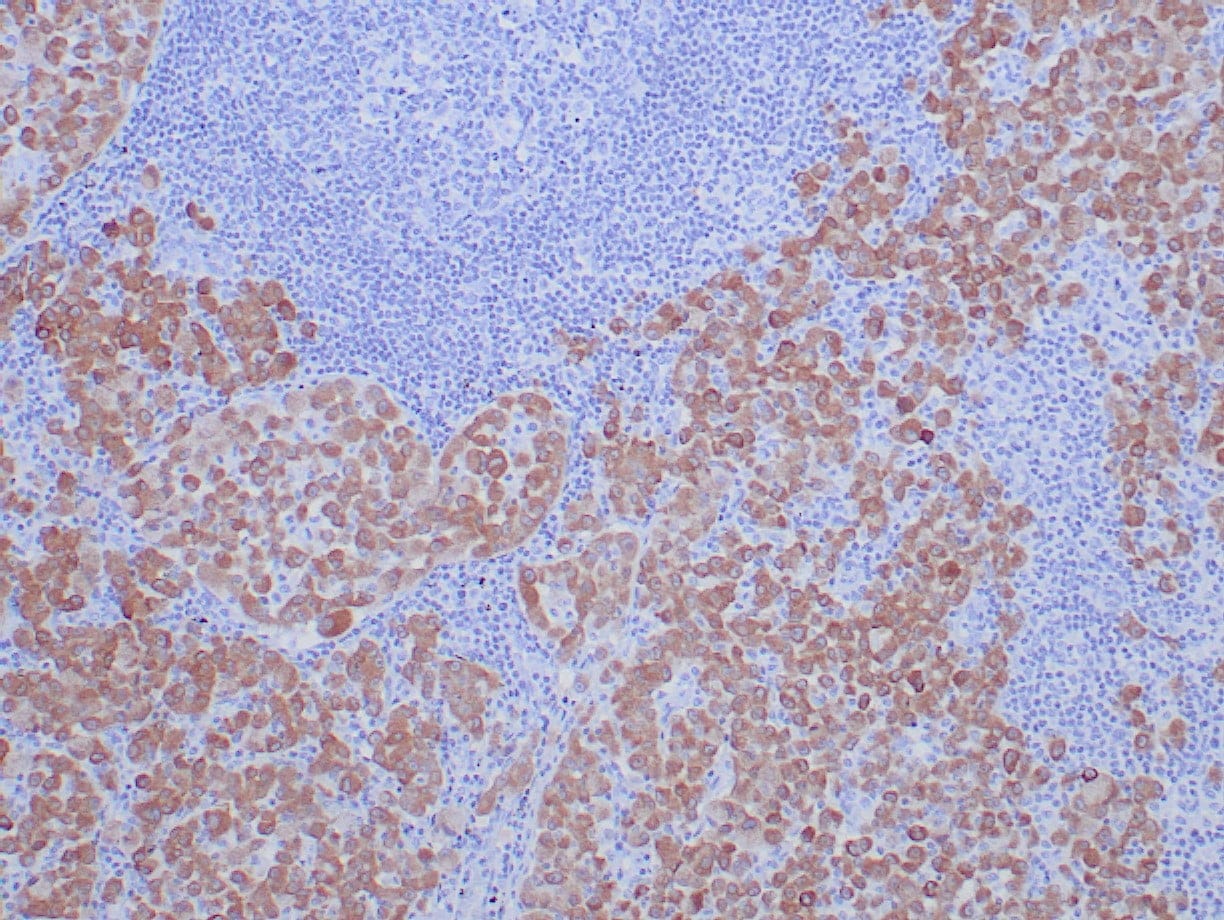 |
| Formalin-fixed, paraffin-embedded human node with metastatic lung adenocarcinoma stained with anti-ROS1 antibody using peroxidase-conjugate and DAB chromogen. Note cytoplasmic staining of tumor cells |
Publications
| pmid | title | authors | citation |
|---|---|---|---|
| We haven't added any publications to our database yet. | |||
Protocols
| relevant to this product |
|---|
| IHC |
Documents
| # | SDS | Certificate | |
|---|---|---|---|
| Please enter your product and batch number here to retrieve product datasheet, SDS, and QC information. | |||
Only logged in customers who have purchased this product may leave a review.
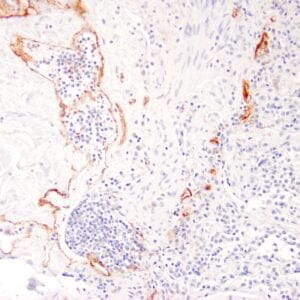
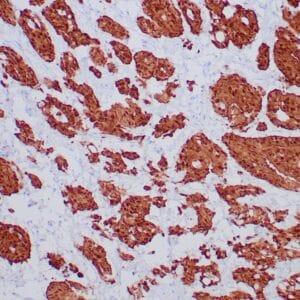
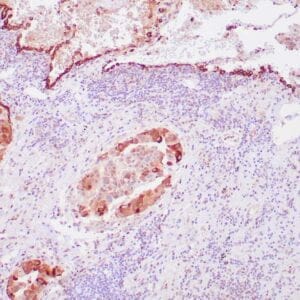
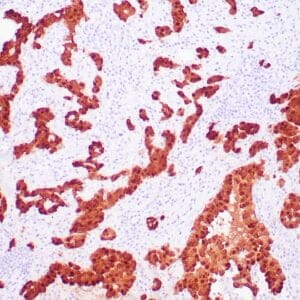
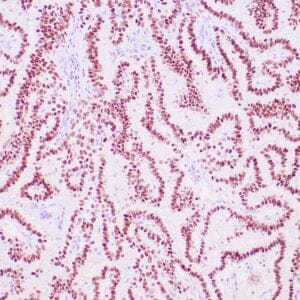
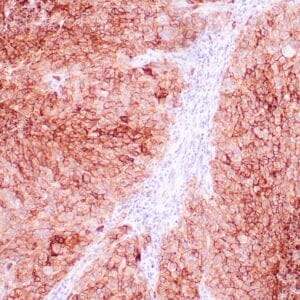
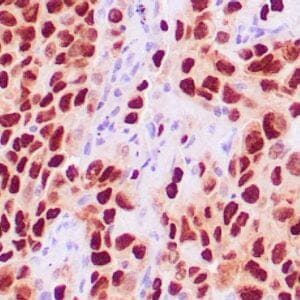
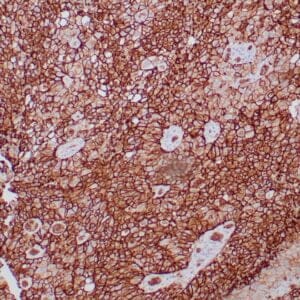
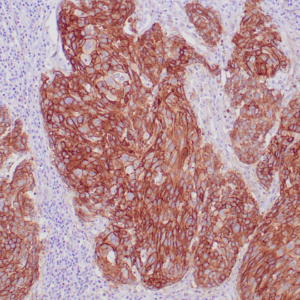
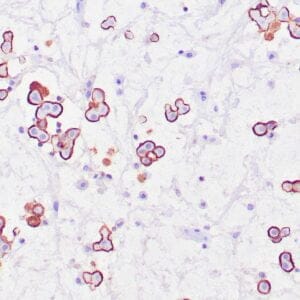
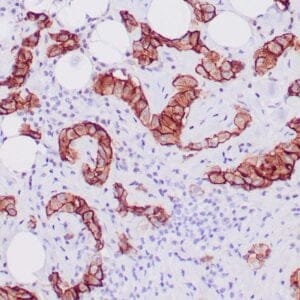

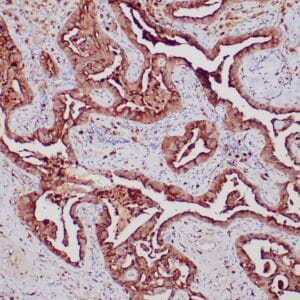
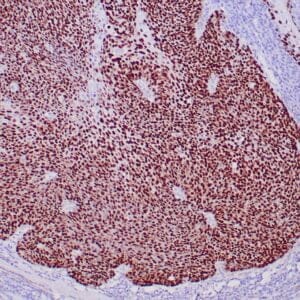
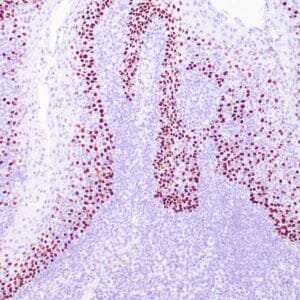
Reviews
There are no reviews yet.